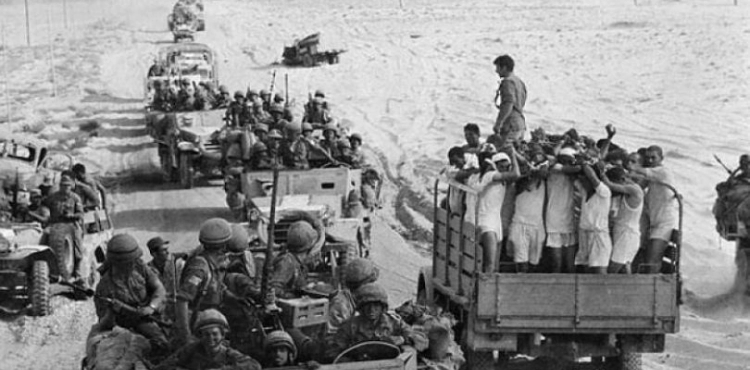Today marks the 52nd anniversary of the "June setback" or so-called 1967 aggression, represented by Israel´s attack on Arab forces (Egyptian, Syrian and Jordanian) before its occupation of the West Bank, East Jerusalem and Gaza Strip, Sinai Peninsula and the Golan Heights.
Israel began the war on June 5, with a surprise military attack on the Egyptian front, launched by two successful attacks on the air bases in Sinai and the Suez Canal. The attack was the point of a three-week period of mounting tension and the all-out war between Israel and Egypt, Syria and Jordan, backed by Iraqi forces during the aggression. After the Israeli army ended the elimination of the Egyptian air force, it turned to the Jordan and Syria fronts. The Jordanian and Syrian planes, together with the Iraqi aircraft, launched raids on the Israeli settlements to ease pressure on the Egyptian front. After 5 June, Arab, Egyptian, Syrian and Jordanian airliners were out of the battlefield. Israel was able to control large areas of Arab land, four times as large as it was when it was established in 1948. The West Bank and the Gaza Strip Gaza, Sinai and the Golan Heights. What the "Israel" Israel managed to control Sinai´s oil resources and water resources in the West Bank and the Syrian highlands, which enabled it to increase immigration and settlement operations in the occupied Arab territories. On the geo-strategic side, the State of Israel was able to establish its new borders at the borders of the ruling territories (the Suez Canal - the Jordan River - the Golan Heights) and thus increased the strategic depth of the Hebrew State. Israel occupied the western part of the city of Jerusalem in 1948, representing 84.1% of the total area of ​​Jerusalem, and caused a new wave of displacement of some 300,000 Palestinians, most of whom settled in Jordan, until the "Nakba Day" another address for the displacement of Palestinians after They were exposed during the Nakba in 1948. This coincided with the Israeli army´s control of Hebron. An Israeli army brigade began to crawl eastward towards the Jordan River. At the same time, Israeli forces attacked Bethlehem, backed by tanks, and the city was taken over. Nablus had a fierce battle on its sides, and without the superiority of the Israeli air force it would have been possible to achieve a victory for the Jordanian army. On the same day, the Israeli army reached the Jordan River and closed the ten bridges between the West Bank and the country. After the withdrawal of the Iraqi army forces, Jericho was under control. "Deep" effects of the setback Among the profound effects of the war were the demise of Gamal Abdel Nasser´s Arab nationalism, and the emergence of a Palestinian patriotic nationalism that now represents the Palestinians of the West Bank, Gaza and the diaspora, which ended the Oslo agreement with Israel in 1993. However, this agreement did not address the problem of settlement, the fate of Jerusalem, the granting of a homeland to the Palestinians, and failed attempts to reconcile Syria with Israel similar to the Egyptian-Israeli agreement, which allowed the restoration of Sinai. The June 1967 war contributed to the demise of Arab nationalism and encouraged Palestinian movements and organizations to transcend the tutelage of Arab regimes. One result is the rise of Islamists as a new force in the region, historians say. The defeat of June defeat is what is known of that defeats represent an opportunity to correct, revise and avoid mistakes. The military defeat represented an opportunity for the military to return to their core mission of defense and war. The Egyptian army was already rebuilt on various bases of discipline and combat doctrine, which enabled Egypt to wage a war of attrition, the October 6 war, defeat the enemy and cross the Suez Canal. But this did not last long and did not extend to the other imbalances. Palestinians relied heavily on the 1967 war In previous statements to Quds Press, Palestinian historian Zuhair al-Debai said that "the Palestinians relied heavily on the 1967 war, believing that they would return to their land, or support the return of the refugees to their towns and villages from which they were displaced." He continued: "But the defeat in that war eliminated all the hopes of the Palestinians, and even aborted the self-unitist resistance to the Arab nation." He stressed the importance of boycotting goods that play a role in influencing the economy of those countries that supported the occupation in its war against the Palestinians.












